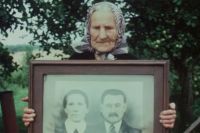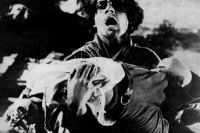Welcome to Close-Up!
What's On
Fri 23 May, 8pm: Red Desert
Colour film provided the gifted painter Antonioni with a dynamic canvas to explore the visionary hues that profoundly saturate Red Desert. Inseparable from this psychosomatic palette, Monica Vitti is again the emotional nucleus whose ennui of the previous films has bloomed into a diagnosed neurosis, further alienating her from the inhabitants of an unbalanced world.
Sat 24 May, 6.30pm: Going Home + Shorts
In 1971, after a nearly 30-year absence, Adolfas and his brother Jonas Mekas returned to their birthplace in Lithuania. They had left Lithuania as young men, destined for a German labour camp. After they came home, Adolfas with his wife, the singer Pola Chapelle, “sang and walked across golden fields and feasted at crowded tables with family and friends."
Sat 24 May, 8pm: L'avventura
An iconic piece of challenging 1960s cinema and a gripping narrative on its own terms, L’avventura concerns the enigmatic disappearance of a young woman during a yachting trip off the coast of Sicily, and the search taken up by her disaffected lover and best friend. Antonioni’s controversial masterwork is a gorgeously shot tale of modern ennui and spiritual isolation.
Sun 25 May, 6.15pm: Battleship Potemkin
Soviet silent film of the 1920s represented a great creative moment in the history of cinema, and Battleship Potemkin is often regarded as its supreme achievement. The film’s formal beauty is balanced by the stark power and humanity of its realist depiction of the uprising and its brutal suppression.
Sun 25 May, 8pm: Ida Lupino: The Best of Her Television Work
The London-born Hollywood movie star Ida Lupino, known as one of the screen’s 'tough girls', found acting insufficient for her intellectual and social ambitions. In 1949, she ventured into directing, “investigating the social condition of women in contemporary society.” This programme features some of Lupino’s most outstanding television work from the 1950s and 1960s.
Calendar
Fri 23 May 8:00pm
Red Desert
Red Desert
Sat 24 May 6:30pm
Going Home + Shorts
Going Home + Shorts
Sat 24 May 8:00pm
L'avventura
L'avventura
Sun 25 May 6:15pm
Battleship Potemkin
Battleship Potemkin
Sun 25 May 8:00pm
Ida Lupino: The Best of Her Television Work
Ida Lupino: The Best of Her Television Work
Tue 27 May 8:15pm
L'eclisse
L'eclisse
Thu 29 May 8:00pm
Solaris
Solaris




